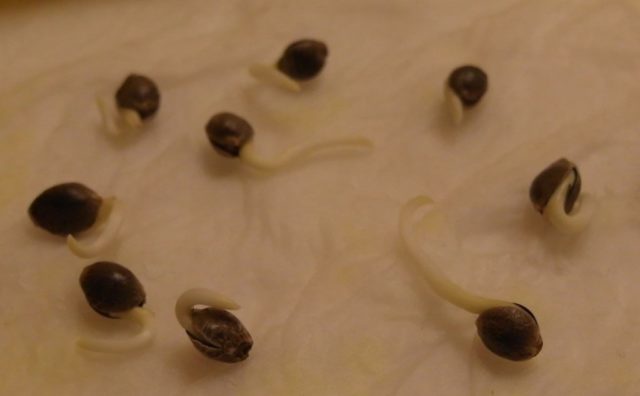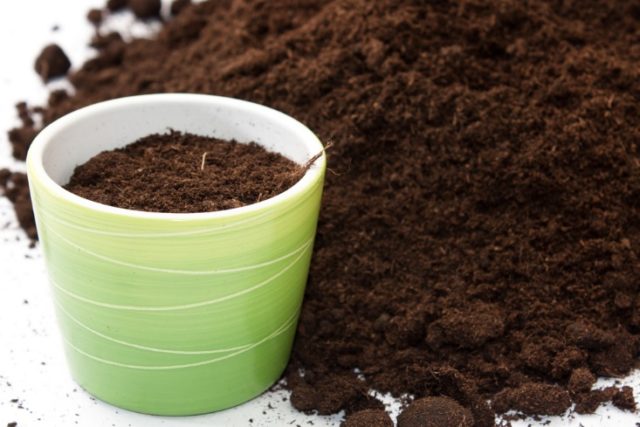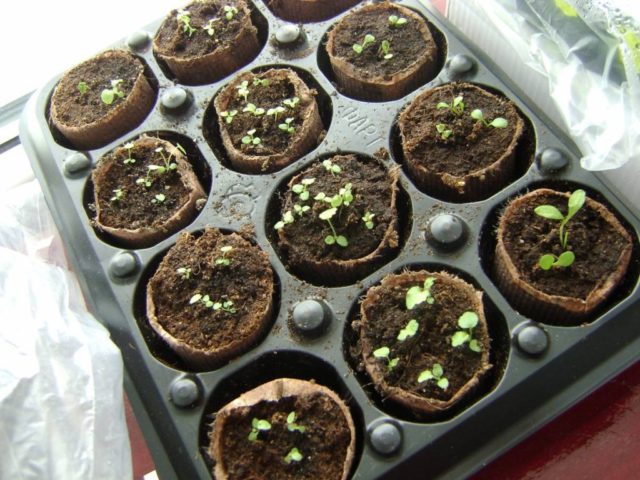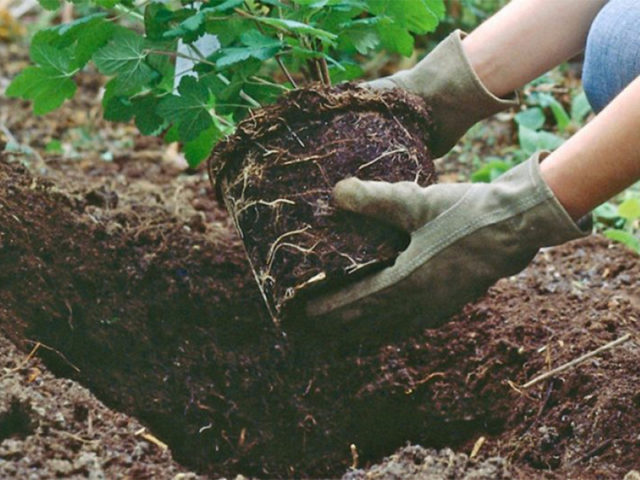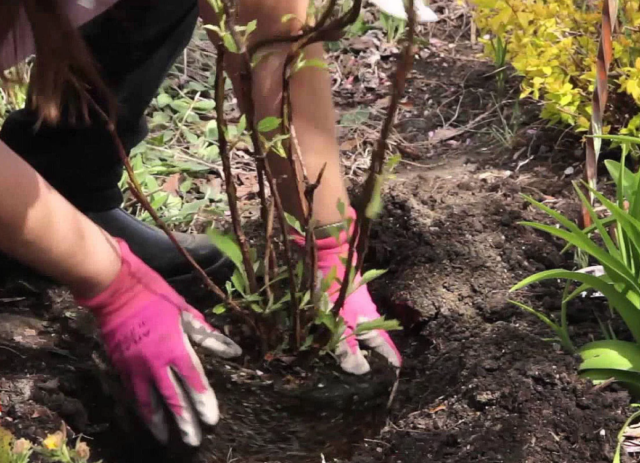Content
Hydrangea Magic Fire is actively used by landscape designers in various projects. To grow it yourself, you need to know how to properly care for the bushes.
Description of the variety of hydrangea paniculata Magic Fire
The name of this plant, translated from English, sounds like "Magic flame". The flower received this name due to the changing color of the petals during flowering. Flowers that appeared in the early period are pale pink. Then they turn bright red, turning into burgundy at the base of the inflorescence. At the end of flowering, the petals seem to fade, and the hue changes again to pink, turning into purple.
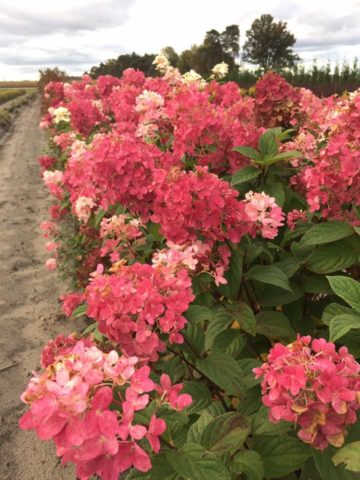
Adult "Magic Flame" has a bright red tint
The panicle hydrangea is called because of the shape of the inflorescence. It is wide at the base and tapers towards the apex. The cone shape resembles a broom. Individual flowers are small, have 3-4 petals of a rounded, slightly elongated shape. The core of each of them does not exceed the size of a match head. It is colored yellow or orange. The cone-shaped raceme in an adult plant can reach 20 cm in height and 10 cm in width. After flowering, the petals fall off, and seeds ripen in their place. Their size is 5-6 mm, they look like apple seeds. The grains are dark brown or black.
The Magical Fire hydrangea has a strong trunk. At the ground, it has 1 short thick leg, from which 8-15 branches grow, so the flower takes the form of a lush bush. The dimensions of a mature hydrangea are from 1.5 to 2 m in height, in width - 1.8 m. The thickness of the branches is 1-2 cm, which allows holding heavy inflorescences and not sagging under their weight. The root system of the flower is strong and branched. There are many thin processes that it is important not to damage during transplantation.
The leaves of the flower are dense and smooth with clear veins. Their shape is lanceolate and their color is dark green. Leaves are distributed evenly across all branches. They grow in 2, each directed in different directions. The gap between them on an adult plant is approximately 5 cm.
Hydrangea Magic Fire in landscape design
Hydrangea looks good along with other plants, and can also be a decoration of the yard in a single planting. Designers recommend planting this flower in places where you want to hide a large gap between other bushes.
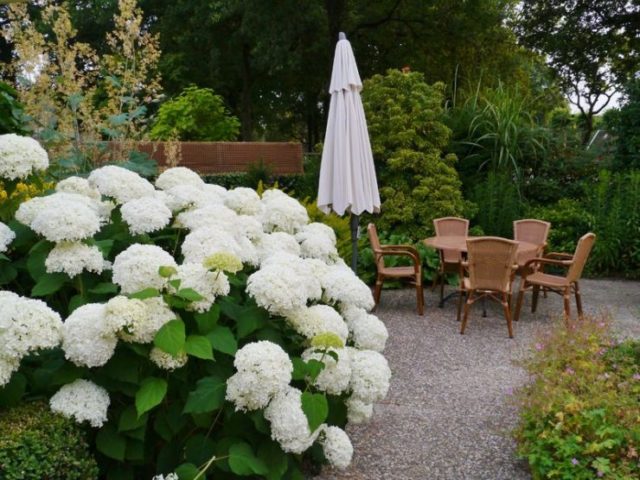
Magic Fire can function as a live fence, but only within the site, for example, fencing off the playground from the picnic area
Hydrangea is not suitable for the length of the fence separating the site from the road or someone else's yard. Its crown is too soft and easy to get through.
The location of the hydrangea on the site depends on the general landscape design. In eastern styles, the Magic Fire is usually planted near the water (pond or pool). In English gardens, hydrangeas are placed in the center of large flower beds. In a country-style recreation area, the Magic Fire is planted with a solid wall.
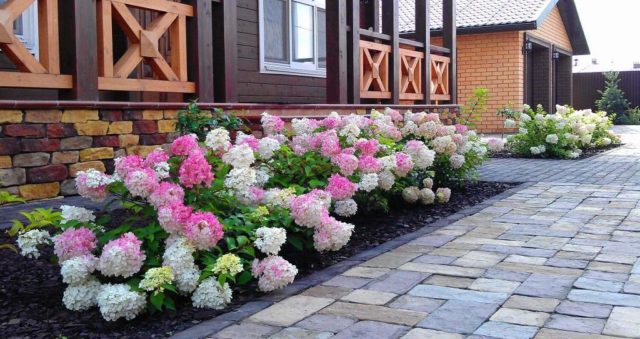
The plant looks good at the facade of the house, as well as at the columns
Winter hardiness of hydrangea Magic Fire
This type of plant is frost-resistant.An adult hydrangea can survive frosts down to -35 ° C without additional shelter, but in regions where winters are more severe, it will be required. In the first 2 years of life, the Magic Fire must be carefully prepared for frost. After flowering, the base of the hydrangea bush is sprinkled with mulch. And with the onset of frost from -10 ° C, it must be wrapped in a covering cloth.
Planting and caring for hydrangea Magic Fire
You can grow a hydrangea at home from seed in February. The seeds from the package must be taken out and carefully examined. They should not have white spots. The surface of high-quality grains is strong, without cracks or chips.
Procedure:
- The seeds must germinate before planting in the ground. This will require cotton wool and boiled water at room temperature. A cotton roll is rolled out and the seeds are laid. From above they need to be covered with a second layer of cotton wool, slightly thinner than the bottom. Then the surface is abundantly moistened with water using a spray bottle. After 2-3 days, the grains will swell and release a white sprout.
Sprouted seeds, ready to plant, have a sprouted white sprout
- Saplings are best grown in wooden crates. The soil must be fertilized. Experienced flower growers advise to dig up forest land in the fall. Such soil contains leaves, moss and needles, which form a good humus.
Land from the forest is the best option for a pot with a future hydrangea
- The grains are planted at a distance of 7-10 cm from each other. You need to make a small indentation with your finger (3-5 mm), immerse the seed and sprinkle it with earth. The soil surface is moistened with water from a spray bottle and covered with a transparent plastic bag or plastic plate. The optimum temperature for the early emergence of seedlings is + 18-21 ° C.
When green shoots appear above the ground, the bag or lid can be removed
- Hydrangea Magic Fire needs to be transplanted 2 times as it grows. After the appearance of the first three leaves and in May, when the weather outside becomes warm. Two weeks before planting in the ground, seedlings need to be accustomed to outdoor conditions. They are taken out onto the balcony, first for a few hours, and later for the whole day.
Selection and preparation of the landing site
The Magic Fire variety prefers sunny or semi-shaded areas. In regions where the summer is hot, it is better to choose a semi-shaded area, and in the northern regions, on the contrary, it is recommended to root hydrangea bushes in sunny places.
The soil at the planting site should be rich in peat and have medium moisture. In dry ground, the Magical Fire hydrangea develops slowly, and in too wet, its roots rot.
The site must be cleared of weeds and a hole 30-40 cm deep must be dug. The width of the depression should be 2 times larger than the ball of plant roots. If you plan to plant several Magical Fire hydrangea bushes, then the distance between the pits should be at least 1.5 m. In each pit you need to lay out a layer of fertilizers: a mixture of peat and humus. Chalk can be crumbled around the edges.
Planting rules for hydrangea Magic Fire
To successfully transplant a panicle hydrangea, the following procedure must be followed:
- Before you take the flower out of the pot, water it abundantly. When the soil softens, the container is gently turned over the canopy, holding the seedling at the roots with your hand.
If the soil with roots comes out tight, you need to shake the pot slightly
- When the roots are completely removed, they are lowered into a prepared hole and sprinkled with earth. Then you need to lightly tamp the ground under the base of the hydrangea bush.
It is important that the roots do not remain above the soil surface.
- The seedling is watered and loosened up the ground.
Watering and feeding
Hydrangea Magic Fire accepts feeding well, and with timely fertilization, the plant blooms more abundantly and magnificently.After planting at the end of May, the bushes can be fertilized by watering them with slurry and water in a ratio of 1:10, as well as minerals that should be purchased at the store. The powder is dissolved in water, corresponding to the dosage indicated on the package, and the flower is watered.
Top dressing is repeated after 2 weeks. When the first buds appear on the branches, you need to use fertilizers containing phosphorus and potassium. This top dressing is repeated 2 times, during periods of leaf color change.
Magic Fire loves damp soil, so watering is required once a week, provided there is no rain. One shrub needs 15 liters of water. If the climate is normal, and the doji go every week, then it is enough to check the moisture content of the soil and water it only once a month.
Pruning hydrangea paniculata Magik Fire
Pruning allows Magic Fire hydrangea bushes to grow more lush and beautiful. In the spring, it is necessary to remove all dead branches with a secateurs, and shorten the healthy processes to 2-4 buds.
When the hydrangea begins to gain color, you need to cut off the weakest inflorescences. This will help channel all your vitality towards developing healthy flowers. If you do not prune in time, the buds will develop slowly, as the hydrangea will begin to nourish the damaged flowers, and the nutrition of healthy brushes will decrease.
Preparing for winter
Before the first frosts, the Magic Fire needs to be hilled by burying the stem 20-30 cm. This will help prevent freezing of the upper part of the roots. It is advisable to cover the root zone with a thick layer of mulch. It is best to wrap young seedlings with a special covering material before the first snow.
Adult hydrangea bushes Magic Fire require such protection only at temperatures below -35 ° C. It is not recommended to water the flower 2 weeks before the expected date of frost. The mulch layer holds all the water needed, and excess moisture can cause frostbite on the roots.
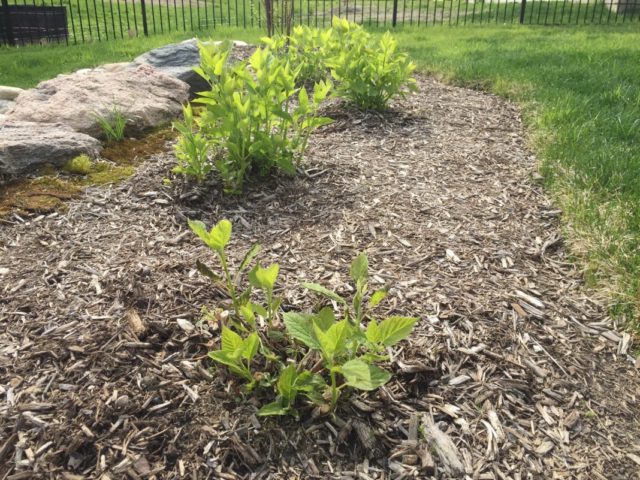
Mulching seedlings in autumn will allow hydrangeas to survive even a harsh winter.
Reproduction
The Magical Fire hydrangea reproduces in the same way as other species from this plant family. The table below describes breeding methods in more detail:
Cuttings | From an adult plant at an angle of 45 °, the green part of the branch is cut off, on which there are 4-8 leaves, the top is left even, without a slant of the cut. Germination is carried out in home pots filled with a mixture of peat, sand and distilled. |
Dividing the bush | Large hydrangea bushes Magic Fire can be neatly divided. To do this, find a place where there is a second thick leg. The ground at the roots is slightly dug up, pre-watered abundantly. The separated part is pulled out and transplanted to another place. |
Offspring | A young shoot is found at the roots and carefully separated from the adult plant, trying not to damage the roots. The offspring can be transplanted directly into the open ground. |
Layers | In the spring, before the buds appear, grooves are dug near an adult hydrangea, where the extreme, young branches are laid. They are sprinkled with earth and fixed with spears. By the fall, the branches will take root and new shoots will begin to sprout. |
Diseases and pests
Panicle hydrangea is susceptible to two types of diseases: powdery mildew and aphids. In the first case, the leaves are covered with yellow spots, and the flowers wither. To help an infected plant, it must be sprayed with Bordeaux liquid or foundation.
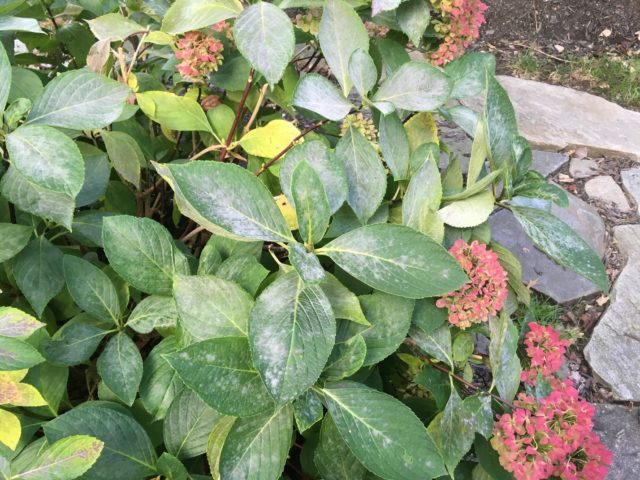
Powdery mildew infects hydrangea leaves, covering them with a white coating
When aphids settle on the bushes of the Magic Fire, they weave a sticky cobweb, gnaw on leaves and flowers and twist them. To get rid of pests, you need a garlic tincture. It needs to be sprayed with hydrangea until the aphid is completely gone.
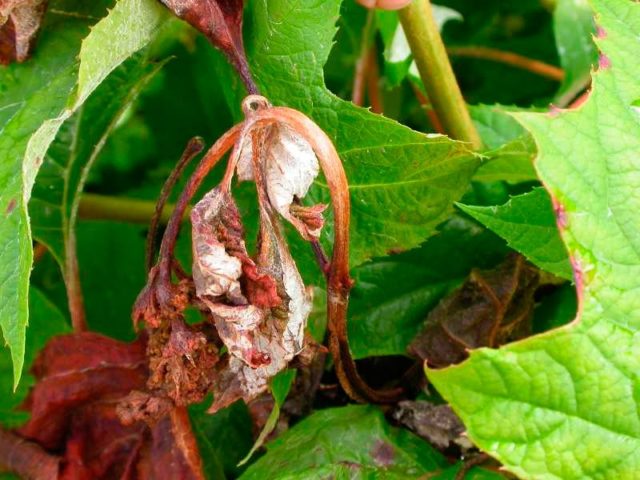
Flowers affected by aphids wither and dry quickly
More information about hydrangea diseases can be found in the video:
Conclusion
Hydrangea Magic Fire is an unusual variety of flowering shrubs that is suitable for decorating any area.The main thing is to properly plant and follow the care recommendations.
